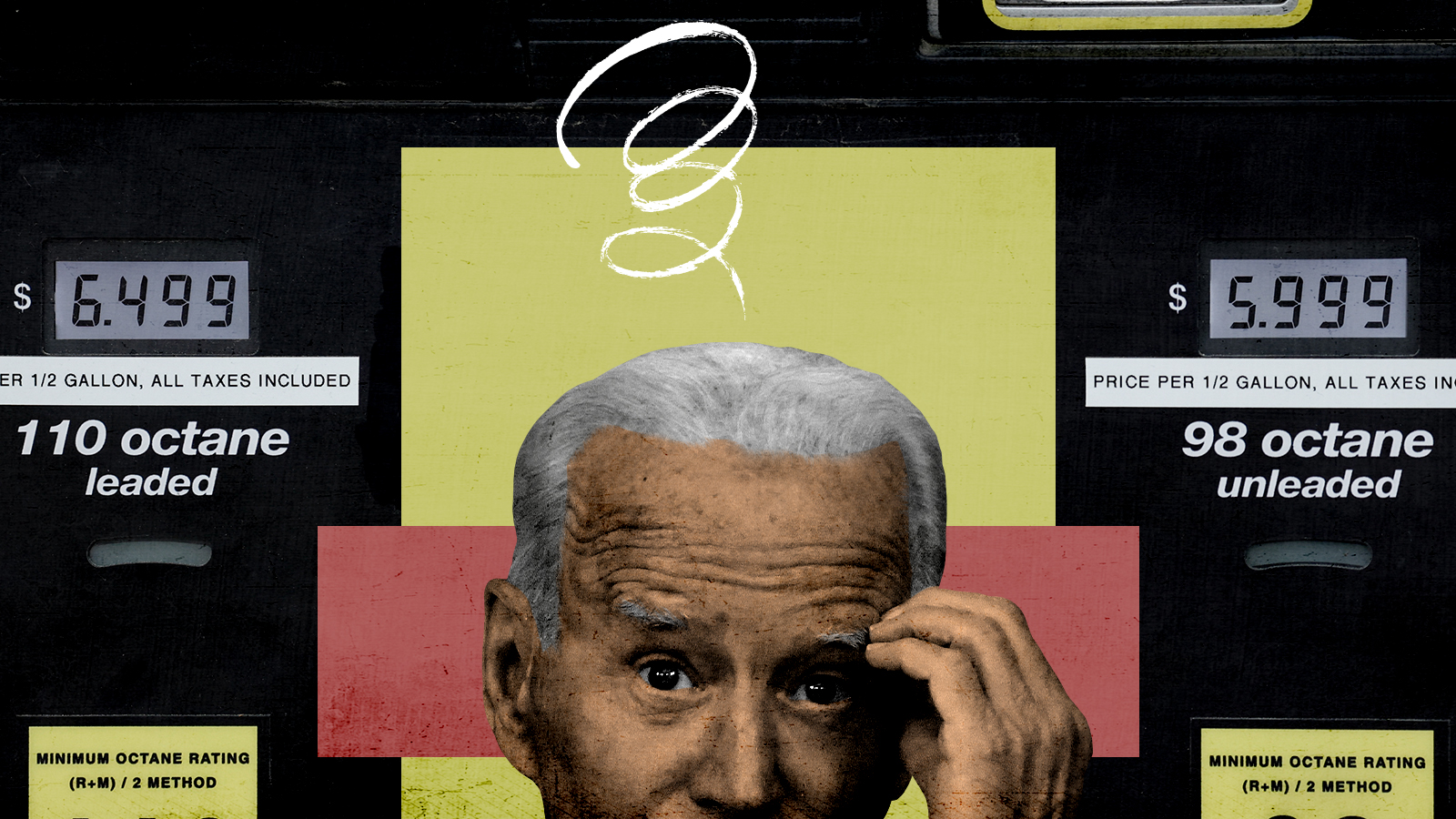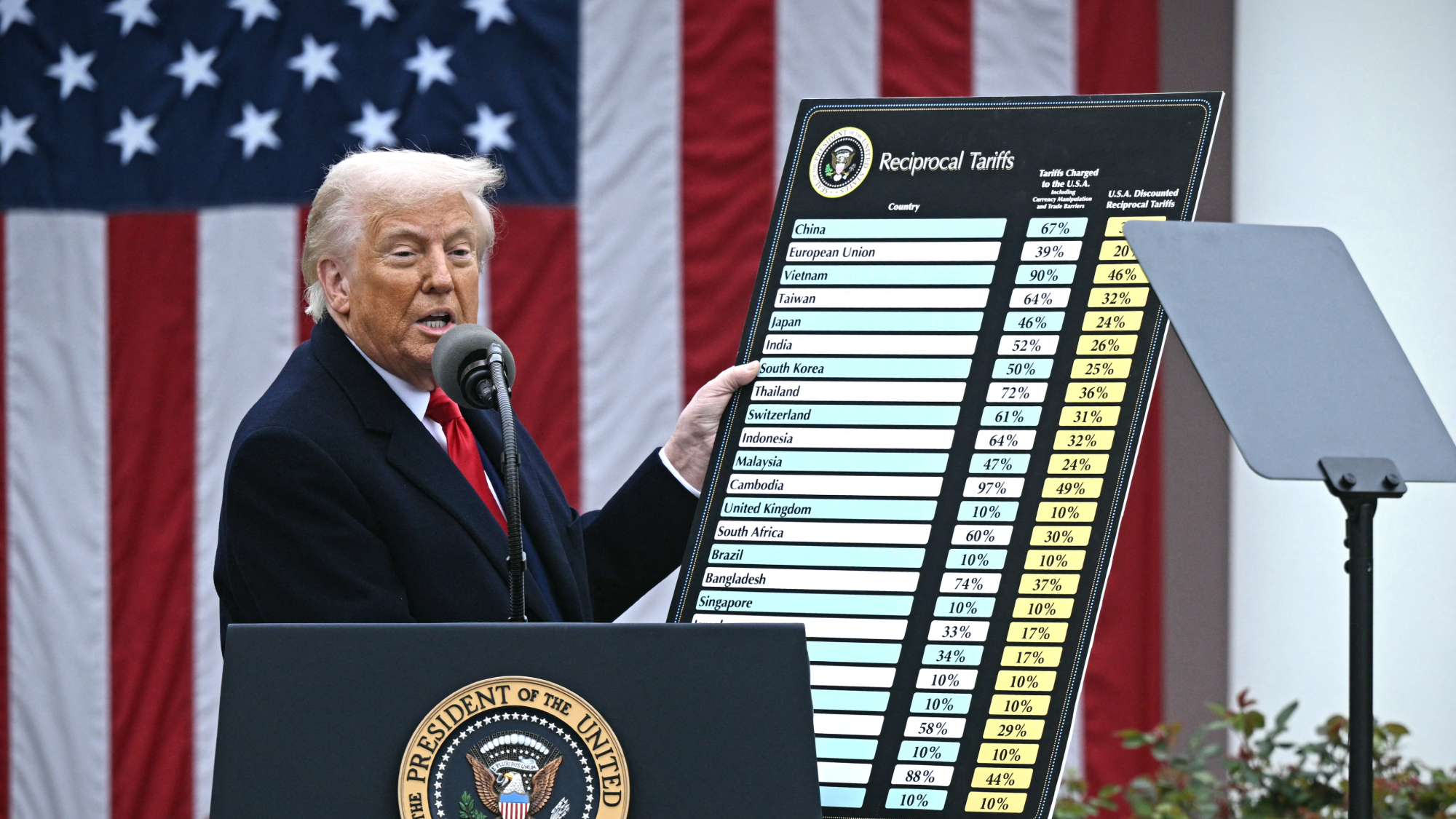Biden's fight with oil companies over high gas prices
The sharpest opinions on the debate from around the web


A free daily email with the biggest news stories of the day – and the best features from TheWeek.com
You are now subscribed
Your newsletter sign-up was successful
President Biden on Wednesday sent a letter to leading oil refiners calling for them to produce more gasoline and dial back record profits to help bring down fuel prices, which have been soaring since Russia invaded Ukraine in February. Biden said oil companies' profits have tripled since the war triggered sanctions against Russian oil and disrupted global supply. "The crunch that families are facing deserves immediate action," Biden wrote. "Your companies need to work with my administration to bring forward concrete, near-term solutions that address the crisis."
Just days earlier, the national average climbed above $5 per gallon, adding to broader concerns about high inflation. The Commerce Department reported Friday that consumer prices had risen 8.6 percent in May, compared to a year earlier, marking the worst inflation in four decades. Biden noted that gas prices were 75 cents per gallon lower last year when oil prices were roughly the same as they are today, around $120 per barrel, and he put part of the blame on refiners' high profits. The American Petroleum Institute responded with a statement saying U.S. refinery capacity has fallen as the Biden administration pushed to reduce fossil-fuel use as part of its effort to fight climate change. Is Biden right to scold oil executives for the pain Americans are feeling at the pump?
It's fair to call out oil companies
Biden's burdens on refineries and his canceling of the Keystone XL pipeline might hurt production in the future, says Will Daniel at Fortune, but that's not why pump prices are rocketing up now. The current problem is due to a "pandemic-driven mismatch of supply and demand," oil-market disruption due to Russia's invasion of Ukraine, obstacles to cranking up oil production, and, yes, "record profit margins from oil and gas companies," which Jay Hatfield, chief investment officer of Infrastructure Capital Management, says account for $1-per-gallon in the current run-up at the pump.
The Week
Escape your echo chamber. Get the facts behind the news, plus analysis from multiple perspectives.

Sign up for The Week's Free Newsletters
From our morning news briefing to a weekly Good News Newsletter, get the best of The Week delivered directly to your inbox.
From our morning news briefing to a weekly Good News Newsletter, get the best of The Week delivered directly to your inbox.
Actually, Biden's the one to blame
What "a lot of drizzly nonsense," says Ed Morrissey at Hot Air. Refiners' profit margins are modest. Marathon's was 3.8 percent in the first quarter. ExxonMobil's was 6 percent. BP had a loss. The real reason for rising gasoline costs, according to industry groups, is "regulatory hurdles that prevent any expansion of refining capacity, along with policy hostility that keeps scaring off investors." If Biden really wants to help, he should rescind his Executive Order 13990, which canceled the Keystone XL pipeline and directed federal agencies to review every Trump-era regulation that conflicted with Biden's climate agenda, making it nearly impossible for refineries to expand operations.
Recognizing the need for more refineries is a first step
Maybe this call to jumpstart refineries means Biden is realizing what's sending gas prices sky-high, says The Wall Street Journal in an editorial. "At least he's finally noticed the dearth of refining capacity to process crude, which some of us have warned about for years." U.S. refining capacity plunged by one million barrels a day in the coronavirus pandemic, and even with a few new refineries in Asia, the International Energy Agency says global capacity dropped by 730,000 barrels a day last year. "A major culprit is U.S. government policy," which has forced some older refineries to shut down because "companies couldn't justify spending on upgrades as government forces a shift from fossil fuels."
There is a better way to fight inflation
"Biden can't flip a magic switch to increase the gasoline supply or otherwise bring down prices at the pump," says Eric Boehm at Reason. Pumping more oil and increasing refinery output "takes time and money," and energy companies aren't going to make that investment while the government's long-term goal is reducing fossil fuel use. "But there is one magic switch that Biden could flip tomorrow to save the average American household about $800 annually: He could repeal the tariffs imposed by former President Donald Trump on steel, aluminum, solar panels, and many other goods imported from China." That won't won't solve the inflation problem — that will take higher inflation rates or a "debilitating recession" — but tariffs are contributing to high prices and eliminating them will help.
A free daily email with the biggest news stories of the day – and the best features from TheWeek.com
Harold Maass is a contributing editor at The Week. He has been writing for The Week since the 2001 debut of the U.S. print edition and served as editor of TheWeek.com when it launched in 2008. Harold started his career as a newspaper reporter in South Florida and Haiti. He has previously worked for a variety of news outlets, including The Miami Herald, ABC News and Fox News, and for several years wrote a daily roundup of financial news for The Week and Yahoo Finance.
-
 The ‘mad king’: has Trump finally lost it?
The ‘mad king’: has Trump finally lost it?Talking Point Rambling speeches, wind turbine obsession, and an ‘unhinged’ letter to Norway’s prime minister have caused concern whether the rest of his term is ‘sustainable’
-
 The billionaires’ wealth tax: a catastrophe for California?
The billionaires’ wealth tax: a catastrophe for California?Talking Point Peter Thiel and Larry Page preparing to change state residency
-
 Bari Weiss’ ‘60 Minutes’ scandal is about more than one report
Bari Weiss’ ‘60 Minutes’ scandal is about more than one reportIN THE SPOTLIGHT By blocking an approved segment on a controversial prison holding US deportees in El Salvador, the editor-in-chief of CBS News has become the main story
-
 ‘They’re nervous about playing the game’
‘They’re nervous about playing the game’Instant Opinion Opinion, comment and editorials of the day
-
 Memo signals Trump review of 233k refugees
Memo signals Trump review of 233k refugeesSpeed Read The memo also ordered all green card applications for the refugees to be halted
-
 Tariffs: Will Trump’s reversal lower prices?
Tariffs: Will Trump’s reversal lower prices?Feature Retailers may not pass on the savings from tariff reductions to consumers
-
 Has Zohran Mamdani shown the Democrats how to win again?
Has Zohran Mamdani shown the Democrats how to win again?Today’s Big Question New York City mayoral election touted as victory for left-wing populists but moderate centrist wins elsewhere present more complex path for Democratic Party
-
 Millions turn out for anti-Trump ‘No Kings’ rallies
Millions turn out for anti-Trump ‘No Kings’ ralliesSpeed Read An estimated 7 million people participated, 2 million more than at the first ‘No Kings’ protest in June



